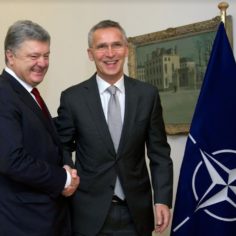On February 7, the Ukrainian parliament approved amendments to the state’s constitution, fixing the international course towards joining the EU and NATO. This decision was supported by 334 Ukrainian deputies with the required minimum of 300 votes.
A look at the text of the adopted law creates the impression that Ukrainian authorities are knocking on the closed doors. The law enshrines a paragraph about the “European identity of the Ukrainian people” and the “irreversibility of the European and Euro-Atlantic course of Ukraine”.
The document also prescribes the responsibilities for the Ukrainian president, parliament and the ministers’ council for ensuring implementation of the strategic course for membership in the EU and NATO.
Regulations adopted by this law are not only questionable because of their lack of reasonability – some of them directly contradict a basic document which enshrines Ukrainian independence, namely, the Declaration “On State Sovereignty of Ukraine”.
The declaration which were adopted in 1990 consists of a paragraph stating that Ukraine “solemnly proclaims its intention to become a permanently neutral state that does not participate in any military blocs”.
But 28 years later, Ukrainian authorities have totally ignored this legal prescription.

NATO Secretary General Jens Stoltenberg and the President of Ukraine Petro Poroshenko at a meeting in 2017. NATO
Omitting legal issues, one might say that the Ukrainian parliament had adopted the law which humiliates people of Ukraine. It is nonsensical when the state at the level of basic law declares its intention to join associations which at the same time had not even considered the question of possible Ukrainian membership.
Both representatives of the EU and NATO have made statements about how the Ukrainian membership in these structures in near future are “unrealistic”. Moreover, NATO’s procedures clearly display that inviting a country into an alliance can be done only provided general agreement among the other treaty parties exist. Mere declarations of intent do not contribute at all to this process.
Another question to be considered: Kiev should realize that few amendments into the constitution made the situation at the south-eastern part of the country even more tense. The vast majority of the population there do not support the notion of joining NATO, not to mention the break-away republics of Donetsk and Lugansk.
At the same time, the adoption of such a document by a constitutional majority of 300 votes does not bode well for those hoping that the current Ukrainian government will promote political decisions that could provide end of the war in Donbass.
Instead, Kiev provokes hatred and rejection with the more than two million citizens – and all that for the sake of a mirage to join associations which future are far from being clear.
















